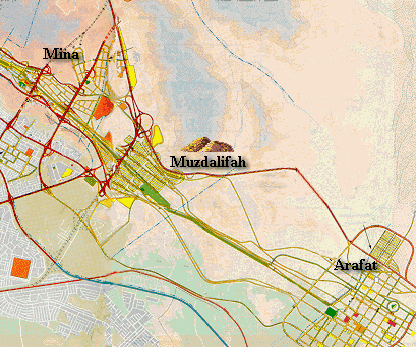 Contents
Contents
Pg.1
|
Hajj and Umrah (Pilgrimage) Table of Contents ↕8. Muzdalifah 8. Proceeding from `Arafah to Muzdalifah 8. Muzdalifah The Almighty Allah says, "Then when ye pour down from (Mount) `Arafah, celebrate the praises of Allah at the Sacred Monument and celebrate His praises as He has directed you, even though, before this ye went astray." It is desirable to increasingly repeat Talbiah on every occasion, and this is one of the most outstanding amongst them all. Also, the pilgrim should recite the Holy Qur'an, and supplicate for Allah earnestly and abundantly. It is preferred for him to say, "There is no god but Allah, and Allah is the Greatest", then, to pronounce the following invocation: "To You, O Allah! I long. And only You, O Allah! I desire. Accept my acts of worship, guide me, provide me with more than what I ask Thee for, do not frustrate me, for Thou art the most Generous One. O Allah! I ask Thee to bestow on me, in this sacred place, all kinds of good, and to mend all my affairs, and to protect me against all kinds of evil. Only You can do this and only You can bestow these upon me." Then, one should pick up seven pebbles in the size of a pea. 8. Muzdalifah 1- Allah, the Almighty, says, "Then when ye pour down from (Mount) `Arafah, celebrate the praises of Allah at the Sacred Monument, and celebrate His praises as He has directed you." 2- According to Jabir's hadith: When the Prophet (peace be upon him) left Muzdalifah, he addressed the people, "O people! adhere to tranquillity." 3- According to Usamah's hadith: Then, the Prophet (peace be upon him) left `Arafah. In Al-Shi`b, he got off to urinate and perform ablution. Then, I (Usamah) said, "O Apostle of Allah! (Is it time for) Prayer?" He (the Prophet) said, "It will be performed at the time (when we arrive in Muzdalifah)." Upon reaching Muzdalifah, he got off and performed a thorough ablution. Then Prayer was established. The Prophet then performed the Sunset Prayer. Everybody knelt their camel and arranged their belongings. Then, the Prophet commanded that Iqamah be declared for the Night Prayer which he performed. Thus, he performed no (supererogatory) Prayer between them. 8. Muzdalifah
8. Muzdalifah
8. Muzdalifah  8. Muzdalifah Time for Performing the Ritual It begins from the dawn of the Day of Sacrifice, the 10th of Dhul-Hijjah (the Shafi`i and Hanbali scholars, however, permit performing the ritual at the second half of the night of the Day of Sacrifice), to the sunrise of the Day of Sacrifice. |
||||||||||||||||||||||||||||||||||||||||||||||||||||||||||||||||||||||||||||||||||||||